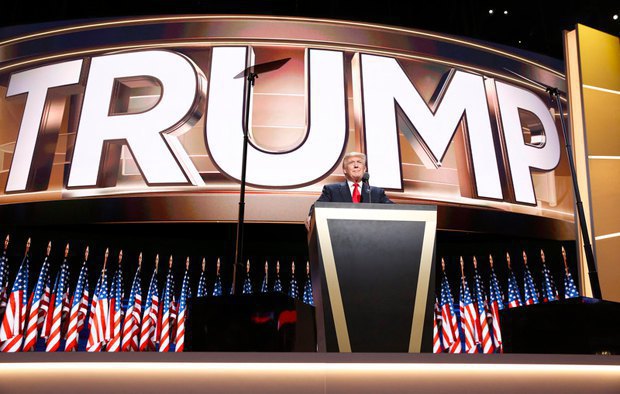
The art of the deal
It started back in 1988. Last Soviet Secretary-General Mikhail Gorbachev was seeking to build relations with the White House and turn US public opinion into his favour. In the meantime, Soviet apparatchiks were looking for US businessmen who could not only invest in the country's economy but literally re-build two large Russian cities (Moscow and Leningrad) to the Western mould. It was back then that Donald Trump emerged on the Russian political arena for the first time.
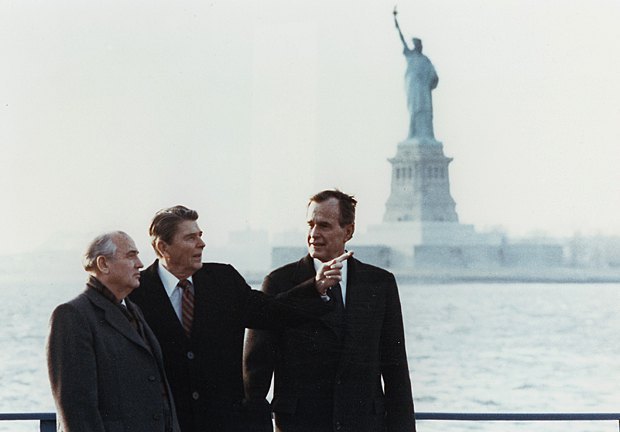
In his book "The Art of the Deal" the businessman recalls his meeting with Soviet ambassador to the USA Anatoliy Dobrynin at one of the lunch receptions. There construction magnate Trump for the first time received a proposal to build hotels in Moscow and Leningrad. Next year he came to Moscow on the Kremlin invitation. However Trump was not given the green light either because Soviet functionaries did not like the US businessman's designs or because he was announced a bankrupt.
From the moment the Soviet Union collapsed to 2013 Trump made at least five attempts to strike a deal with the Russian elite to build various facilities. Rumour has it he was captivated by the idea to build a hotel complex, Moscow's copy of New York's Trump Tower. It is interesting that the US billionaire started new talks during a financial crisis every time his companies were recognized bankrupt.
To reach his goals, the tycoon did not shy away from holding talks with the Russians who had blood of thousands of innocent people on their hands. In January 1997, Trump met Gen Aleksandr Lebed. Lebed came to the USA to attend Bill Clinton's inauguration. After Boris Yeltsin decided to dismiss him from the post of the Russian Security Council secretary, the embattled general took it into his head that he would take the helm of Russia by replacing Yeltsin as head of state. He went to the States to secure support for this. Both the Republicans and Democrats gave him a rather warm reception however, understanding his autocratic intentions, they denied Lebed proper financial support.

Having little idea of the political situation, Trump invited Lebed to his New York hotel to solicit the future president's, as Trump thought, support for a hotel complex in Moscow. The details of this meeting were reported by The New York Times. According to the daily, the general accepted Trump's proposal, noting half-jokingly that "the world's tallest skyscraper cannot be built close to the Kremlin". "We cannot let anyone spit from the skyscraper's roof down at the Kremlin," he added.
Trump's dreams did not come true. In a year, Lebed was appointed governor of Krasnoyarsk Kray where in April 2002 the general "happened" to die in a helicopter crash.
After his unsuccessful experience with Lebel, Trump and his family paid regular visits to Moscow to talk to big business about building a hotel. However Russian nouveau riche were least interested in building a hotel complex in Moscow, they wanted to buy themselves real estate in the USA. Donald Trump made it up to the oligarchs. In 2008, the billionaire's son, Donald Trump Jr., said: " Russians make up a pretty disproportionate cross-section of a lot of our assets."
The Kremlin promotes Trump
The hotel story would drag like this had the Kremlin not thought of having "its own" US president on the eve of its aggression against Ukraine. In 2013, Russian oligarch Araz Agalarov, allegedly asked by his son Emin, invited the owner of the Miss Universe beauty pageant, Donald Trump, to hold an event in Moscow. The US tycoon gladly agreed, hoping that Agalarov would help him build a hotel. After the event Trump said that he finally made a deal to build a hotel complex in the Russian capital. In the next three years, construction did not start but the Agalarovs were frequent guests of Trump in the USA.
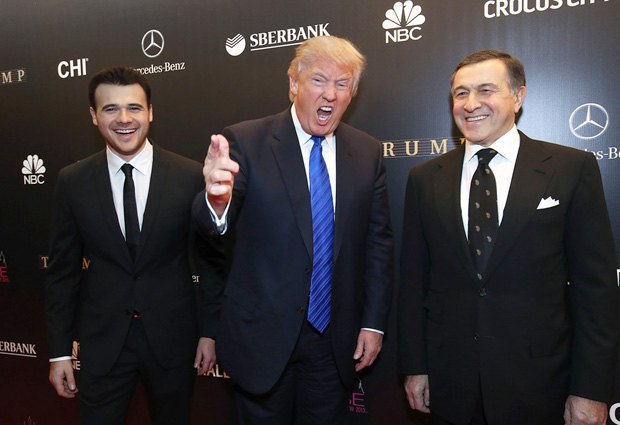
Agalarov made his fortune by building hotels and entertainment centres under the Crocus network brand the state permits for which he secured directly from the Kremlin. What is more, the authorities often turned a blind eye to his troubled projects. However Agalarov's influence never extended to the Russian president whose support Donald Trump was seeking for his projects in Russia. However, another person, Ilgam Ragimov, has this influence.
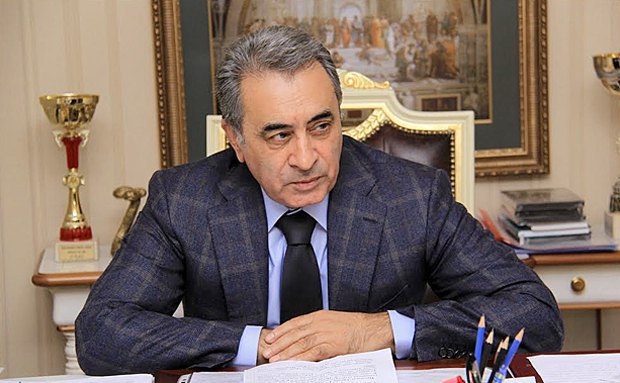
According to Russian Forbes, Ragimov is a co-owner of the European shopping centre, the Ukraine Hotel, he has a stake in the Rizhskiy market of electronics and the Moskva wholesale and retail centre. Ragimov is known to have bought a land plot on the southern coast of Crimea to build a Crimean Breeze hotel and then successfully transferred all the rights to build a hotel to one of Gazprom's subsidiaries, Gazprom Dobycha Orenburg.
However Ragimov takes the biggest pride not in his business achievements but in 40 years of friendship with Vladimir Putin. These two men have known each other since university when Ilgam was the head student of the group which included the future Russian president. By the way, the start of Ragimov's business career was closely connected to Putin's rise to power.
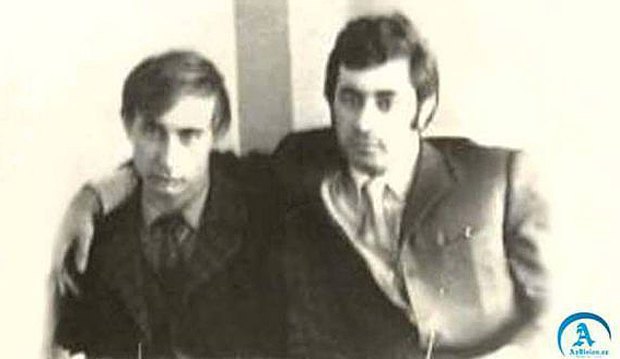
In addition to Putin, Ragimov is also a friend of Agalarov Snr. Both are senior members of the All-Russian Azerbaijani Congress which includes 12 billionaires. Ragimov and Agalarov used to co-own the Cherkizovskiy market.
So this motley crew with its close connections to the Kremlin became the party which invited Trump to Moscow.
Trump and Russian mafia
In 2004, when lawsuits came spilling out on Donald Trump because of his bankruptcy, he was in a rush to find a "sponsor" to save his business. Russian oligarchs helped him out. A shell company, Bayrock Group, was set up for money transfers. It was chaired by Tofik Arifov and Felix Sater. Both had links to the Russian underworld.
Tofik Arifov is a former employee of the Soviet Vneshtorg (foreign trade representative office). Having direct connections to crime rings, he was involved in carving up the Russian aluminum market in the 1990s. He was indirectly involved in creating the notorious offshore company Trans World Group (TWG) which was soon authorized by the Russian government to export aluminum and import alumina without paying duties. Arifov made regular use of criminal "aluminum" cooperatives to launder money received from the sale of weapons and drugs.
In 2000s, he managed to dissociate himself from criminal institutions and join the ranks of Russian "businessmen". However in September 2010 Arifov was unlucky. In the course of a special operation, the Turkish police stopped the Savarona yacht once owned by Turkey's founder Ataturk. They found prostitutes onboard. It turned out that the girls were smuggled from Turkey via Russian and Ukrainian model agencies. Tofik Arifov was among the suspected organizers of the brothel. He managed to escape punishment. Telman Ismailov, one of the owners of the Cherkizovskiy market, who was on the yacht during the operation, was less lucky. After the Turkish incident, the Kremlin launched a massive campaign to destroy Cherkizon (Cherkizovskiy market). After Islmailov's career came to an end, all the vendors from the Cherkizovskiy market moved to the biggest wholesale market Sadovod owned by Putin's close friend, Ilgam Ragimov.
Felix Sater's success story is also quite impressive. In 1993, the son of a Russian crime boss, Felix Sater, ended up in a prison over a brawl in a US bar. Police spotted him again when he was trying to buy Russian missile rockets from a Central Asian country. In 1998, he was suspected of creating a fraudulent scheme at the stock exchange through which he stole around 40m dollars. In 2000, Sater met a Moscow developer and Mirax Group owner, Sergey Polonskiy. Polonskiy is in custody now, and his case has been sent to court. He is suspected of construction fraud and especially gross embezzlement. Board member Felix Sater managed to avoid prosecution.
Donald Trump's connections with the Russian mafia were exposed in 2013 when the billionaire had to testify in the case on the sale of housing in Trump SoHo. The complainants said they were lured by Trump's name when they bought apartments there. However they were unaware that only 10 per cent of all apartments had been sold. This was the case of Bayrock Group headed by same Arifov and Sater.
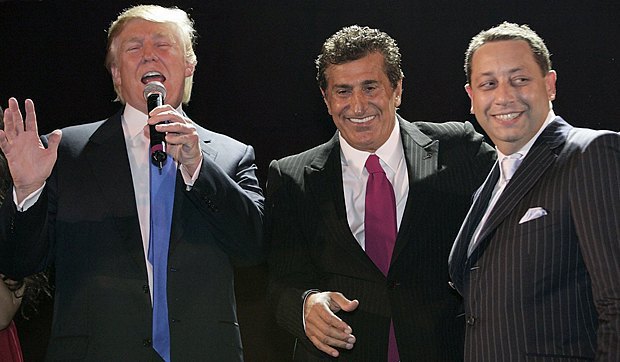
Trump said in his statement that he was drawn into the Bayrock project by his close friend Arifov and that he did not know Sater at all. Later the ABC TV channel's journalists learnt that Sater was a senior adviser to the current candidate for US president.
The case was hushed up. In September 2014, the creditors announced the sale of Trump SoHo. This was the end of Bayrock Group's history.
The only victim was the company's executive Jody Kriss who was accused of fraud. During the investigation he suggested the money had been coming from Russia.
Another source of funds for Bayrock Group was the no longer existing Icelandic fund FL Group. Kriss said in his statement that the money of Russian investors close to Putin came through this fund. It was owned by influential Russian immigrant Temuraz Sepiashvili. His name was often mentioned in the case on a long-lasting dispute over the Moscow oil refinery. It is interesting that Sepiashvili passed away a week after Bayrock Group closed.
Advisers from the Kremlin
Trump has affairs with Russians both as a businessman and a politician. The presidential candidate has a weird way of choosing his political entourage. His whole campaign staff consists of Kremlin mercenaries.
In charge of Trump's presidential campaign is Paul Manafort who is well known in Ukraine. He arrived in our country on Rinat Akhmetov's request in mid-2005 to provide counsel for SCM Holdings. At the 2006 parliamentary election, the spindoctor worked with the Party of Regions. It was Manafort who brought Yanukovych to power in 2010.
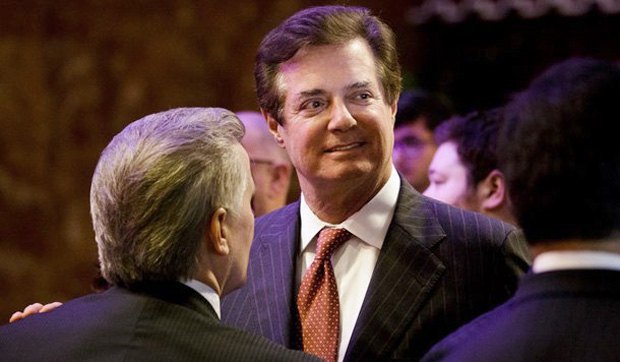
Manafort also worked with Ukrainian oligarch Dmytro Firtash, Putin's close associate in gas and other business interests. According to US Slate, Firtash and Manafort bought the site of New York's old Drake Hotel. The project was called the Bulgari Tower. The developers said they would build a grand entertainment centre which never saw the light of the day for some reason. Instead Firtash and Manafort built a fortune on this scheme.
However the project organizers also had other goals in view. According to Slate, Firash tried to funnel his money from Ukraine to Manhattan. "In 2008, Firtash wired 25m dollars to New York to bankroll the project. According to court documents, he also set up a 100m-dollar investment fund, paying Manafort and his partners a 1.5m-dollar fee for managing the money," Slate said.
Now Manafort has a say on what resolutions get passed by the US Republican Party. These were Manafort's backstage efforts behind the decision to exclude the call to give Ukraine lethal arms from the party's platform. Mike Pence (Manafort's protégé) introduced by Donald Trump as candidate for vice-president of the USA has been criticizing the White House for a week now over its failed policy on Russia. "History teaches us that weakness arouses evil. Hillary Clinton and Barack Obama’s foreign policy of leading from behind; moving red lines; feigning reset with Russia; and the rise, rule, and reign of ISIS are a testament of this truth of history," he said.
Trump's foreign policy adviser Carter Page consulted Gazprom in the 2000s. In March 2016, it transpired that Page owns this company's shares.
One more adviser to the US mogul is Michael Caputo who worked the groups supporting Boris Yeltsin in the 1990s. In the 2000s, he signed a short-term contract with Gazprom Media. His task was to promote Putin's positive image in the USA.
Richard Burt, also an adviser to Trump and former Reagan aide, was on the board of directors of Russian Alfa Bank and an investment fund with a big stake in Gazprom.
Lt-Gen Michael Flynn, yet another adviser to Trump and a former director of the Defence Intelligence Agency, has recently been seen with Putin at the anniversary of the Russian propaganda channel Russia Today.
Trump on the hook
Hackers associated with the Russian special services have recently intruded into the network of the Democratic National Committee and gained access to the entire database of investigation into Trump.
Of course, one may assume the Kremlin is planning to leave the opponents without their trump cards against Trump. However it can also be interpreted as Moscow's preparedness to blackmail the mogul should he become the US president.
It is difficult to predict the outcome of the US election. Nevertheless it is not difficult to predict whose political interests potential president Trump will bring to life.








